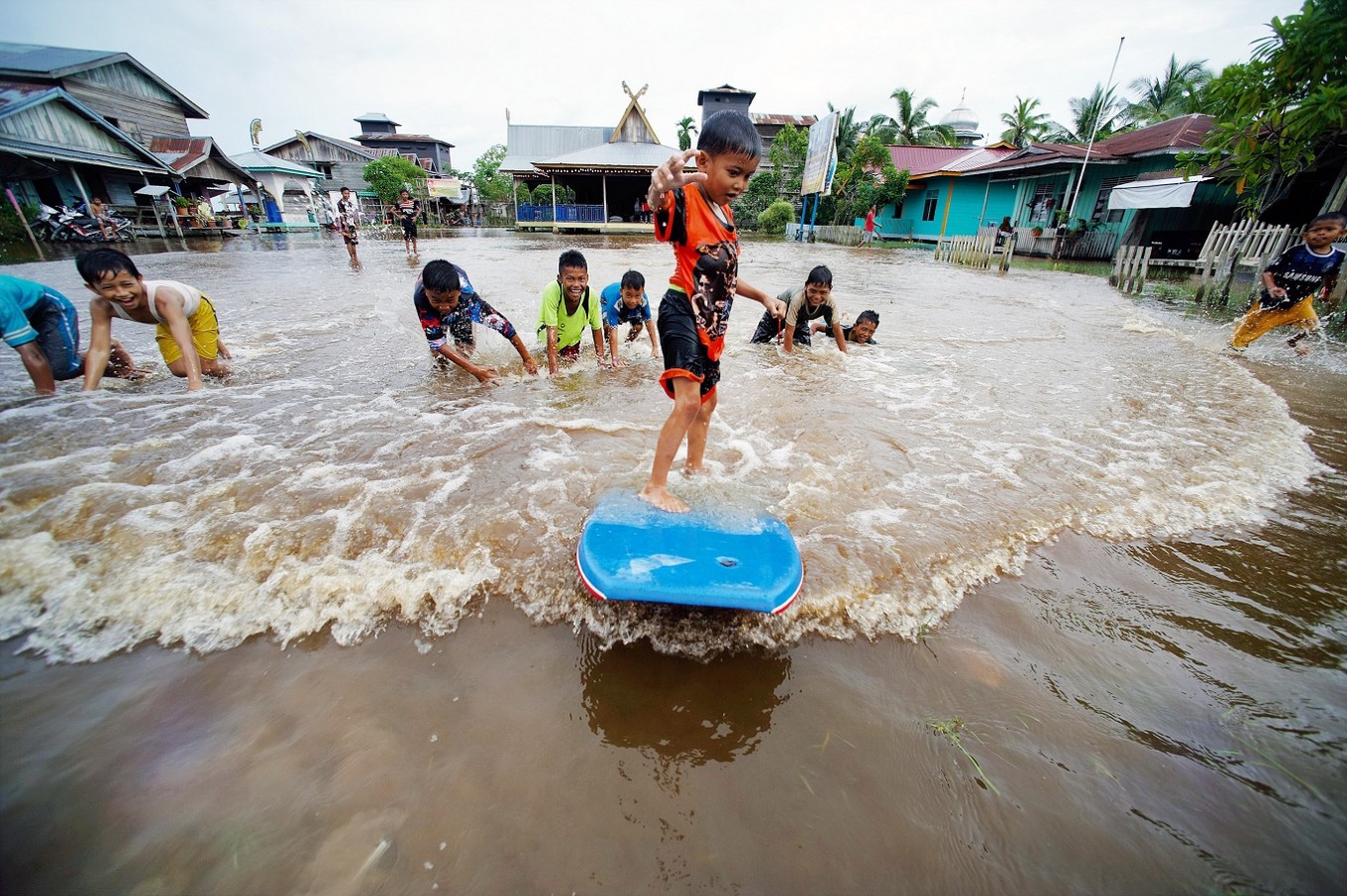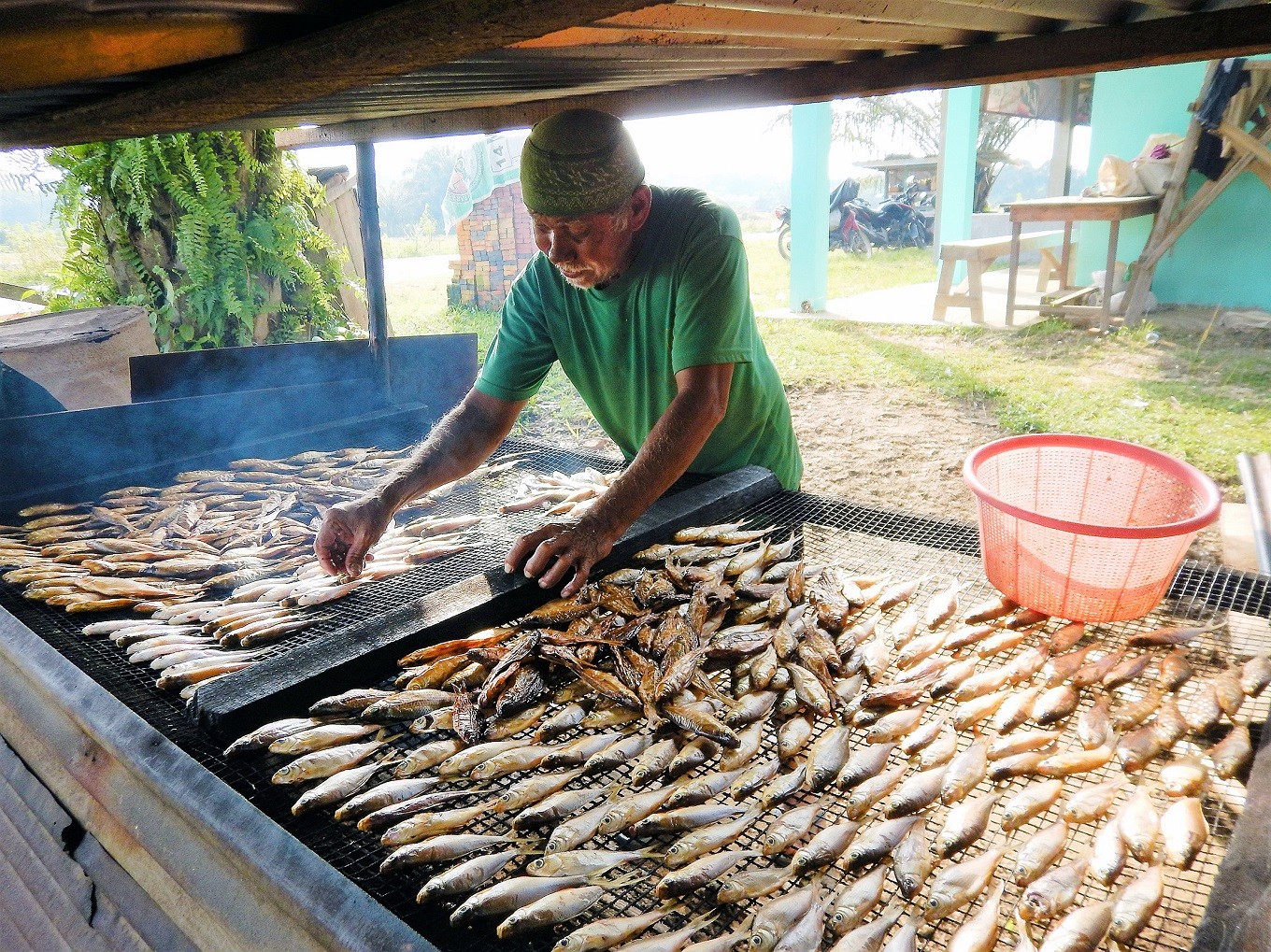How the Kampar people adapt to floods
These people try to look on the bright side of their despair.
Change Size
 Surf's up: Children surf in floodwater in a village on Meranti Bay, which is located near the Kampar Rimper in Riau province. (JP/Syafrizaldi)
Surf's up: Children surf in floodwater in a village on Meranti Bay, which is located near the Kampar Rimper in Riau province. (JP/Syafrizaldi)
F
loods have become an inevitable annual occurrence for people living along the banks of the Kampar River in Riau province, inundating settlements, farmland and everything else in the way. Despite such gloomy conditions, a number of residents, while praying that the local administration does something to improve the situation, have found a way to deal with life by the river.
It was the fourth day of inundation in the village where Naufal resides, yet people there appeared to be accustomed to the conditions, even with no incoming aid and despite mass media having already reported on the severity of the flood.
Naufal, 4, gazed intensely at the muddy waters on the Lipai riverbank, a tributary of the Kampar River, before cautiously and tirelessly inching closer to the river for a clearer view of the fish being hunted. Any sudden movements would scare off the fish. “If we can catch it, we will cook it,” he said. With a long wooden stick, he beat the water repeatedly in an effort to catch a motan (tiny scale barb), until one swam to where his stick landed.
“Hooray, I’ve got one!” Naufal said in excitement. He put the fish into a plastic bag and was ready to beat the water again.
Being so young, it was his first experience catching a fish by himself during a huge flood. His brother, four years older, watched over him nearby, while his father smiled, watching the boys at the edge of the river while preparing a fishing net.

Naufal had fun playing in the river and catching fish until early afternoon. He tailed his father and helped him remove the fish trapped in the net. After calling it a day, Naufal separated his only fish from his father’s catch, saying he wanted his fish to be fried separatedly.
Naufal and his family were not the only ones in the village that caught fish in the floodwaters. Local fish catchers claimed they caught bags of fish because of the high water levels.
Another village resident, Rakhmat, 56, was on his home terrace, cleaning fish he caught at a former tin mine in his village of Siabu in Kampar regency. Roughly 300 mining pits had been turned into ponds in the area. The mines were closed 40 years ago, leaving the pools teeming with fish.
Read also: Indonesian students create device to monitor air quality
“When I was young, there were still tin trucks and dredgers, but they are now gone and its scrap metal has been sold,” Rakhmat said.
“Normally I only get 2 to 3 kilograms of fish daily. When it floods, the amount increases to 15 kilograms,” he said. On March 10, he collected 12 kg of fish, which was processed into 3 kg of smoked fish.
He fed a firewood block into a simple furnace beside his house to make a fire for smoking fish.
“The fire to smoke fish shouldn’t be too big, so we’ve got to keep a close watch on the furnace,” he said.
Rakhmat took a bowl of entrails removed from the fish he had earlier cleaned and dropped its contents on top of the burning wood. “Burned entrails will make smoked fish more delicious,” he said.
After more than two hours, the smoked fish was packed into plastic bags to be sold the next morning. At the Bangkinang market, where Rakhmat’s loyal customers frequent, smoked fish costs Rp 55,000 (US$4.12) per kg.
Some kilometers downstream of Lipai eastward, the Kampar River winds around Meranti Bay village. The recent floods brought joy to children in the village, where a small field in the village center was converted into a surfing spot, as sea waves and river currents met to produce peaks, locally called bono, that reached as high as 3 meters.
Ubay, 6, was among the kids attempting to ride the bono. Several bigger children pushed the water to form waves. Although falling several times, Ubay was finally able to maintain balance by spreading his arms.

“When floods hit this place, we train, otherwise we wouldn’t be able to practice surfing,” he said.
Despite all the fun, floods remain a disaster that can claim lives and damage property. Harry Oktavian, the director of Sustainable Social Development Partnership (Scale Up), a non-governmental organization, said although flood victims around the Kampar River tried their best to adapt, a disaster response team was needed.
Read also: Guarding the forest
The people, he said, should not have been forced to deal with the floods on their own. He said the floods were caused by the adverse impact of forest conversion into housing areas and that the administration should improve the situation by preserving natural forests.
“The floods aren’t just along the Kampar River. The whole river catchment zone in Riau has been severely damaged,” Harry said.
The Lipai area and most of the Kampar River catchment area used to consist of lowland natural forests, which have now been converted into largescale estates. The conversion has created numerous land conflicts. Since 2007, Scale Up has recorded 526 land conflict spots in Riau, covering about 2.2 million hectares of land.
Without proper flood mitigation practices, locals living near the Kampar River will continue to suffer from floods. In the meantime, they are left to survive by catching fish, like little Naufal.









